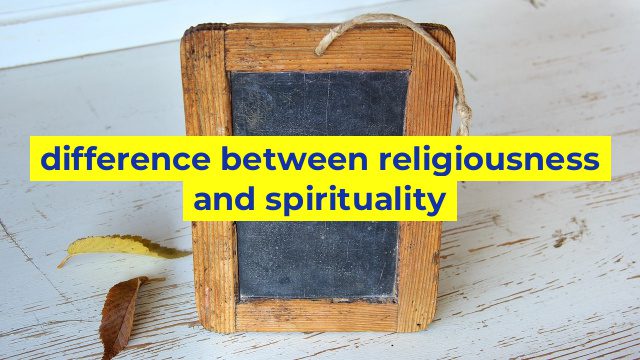The Difference between Religiousness and Spirituality
When it comes to discussing the concepts of religiousness and spirituality, confusion often arises. While both ideas share some similarities, they differ in their approach towards existence, faith, and belief systems. In this article, we will elaborate on the difference between religiousness and spirituality.
Religiousness Defined
Religiousness is the practice of following a specific religion or a structured belief system that outlines principles, values, and rituals to connect with a higher power. It can be defined by one’s adherence to prescribed doctrines and the faithfulness to organized religious institutions. It involves a set of rituals, customs, and practices that have been passed down from generation to generation.
In general, religiousness involves a set of practices that one follows to enhance one’s worldly life while also preparing for the afterlife. These practices can range from prayers, fasting, confession to celebrating religious festivals, and making charitable donations.
Spirituality Defined
Spirituality is a more personal and intuitive connection with the higher power. It is not limited to any particular religion or belief system. Rather, it is a way of seeking answers beyond oneself, in a quest to define one’s purpose in life. Spirituality aims to develop an individual’s consciousness and inner peace through personal reflection, introspection, and meditation.
In contrast to religiousness, spirituality does not rely on specific external practices or prescribed doctrines. Rather, it is a personal journey of self-discovery that may lead to an improved sense of well-being and inner fulfillment.
The Differences between Religiousness and Spirituality
The primary difference between religiousness and spirituality is their focus on tradition and beliefs. Religiousness focuses on rigidly defined beliefs and practices that are passed down from one generation to the next. Spirituality, on the other hand, emphasizes the individual’s personal journey to discover and define one’s beliefs.
Another significant difference is that religiousness tends to be more structured and conformist, while spirituality allows more room for individual expression and exploration. Religiousness involves following specific codes of conduct and ritual practices, while spirituality encourages free-thinking and personal reflection.
Finally, while religiousness is more concerned with external behaviors and practices, spirituality is more focused on the internal aspects of oneself. In other words, religiousness is more concerned with the external expression of faith, such as attending religious services or performing religious rituals, while spirituality seeks inner growth and connection with the divine.
In Conclusion, both religiousness and spirituality provide pathways for individuals to connect with the divine. However, they differ in their approaches and emphasis. Religiousness is more structured and traditionally oriented, while spirituality is more personal and intuitive. Ultimately, both approaches can lead individuals to a sense of inner fulfillment and peace.
Table difference between religiousness and spirituality
| Aspect | Religiousness | Spirituality |
|---|---|---|
| Definition | Strict adherence to a religious doctrine or belief system. | A more personalized and individual approach to connecting with a higher power or divine force. |
| Practices | Regular attendance at religious services, following specific religious ceremonies and rituals, and obeying religious laws, commandments, or rules. | Meditation, prayer, self-exploration, mindfulness, and other self-directed practices that elicit a sense of peace and inner connection. |
| Community | Strong bond with other members of the same religion, sharing common beliefs and values, and participating in group activities or events. | A more individualistic approach to spirituality, in which one’s relationship with a higher power is personal and subjective, often independent of organized religious groups or institutions. |
| Beliefs | Subscribing to a set of beliefs or doctrines that are prescribed by the religion, such as the existence of a divine being, holy scriptures, and an afterlife. | Belief in the existence of a higher power or divine force, but without adherence to any specific set of religious doctrines or practices. |
| Goal | To achieve salvation, eternal life, or a state of spiritual purity by obeying religious laws and living a righteous life. | To attain a sense of inner peace, harmony, and connection with the universe, independent of any specific religious goals or beliefs. |
